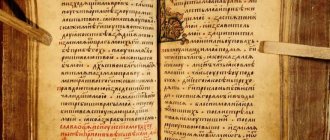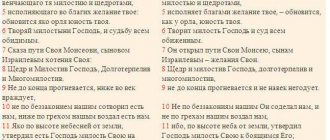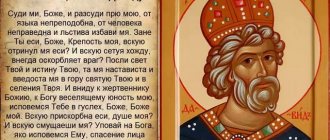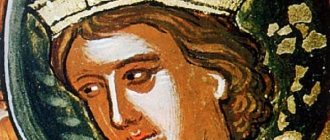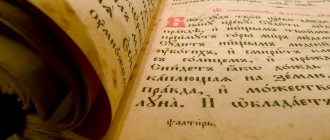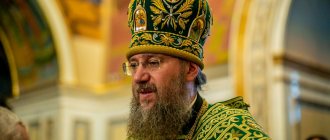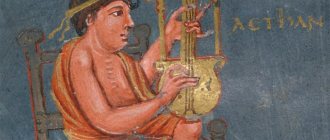Text of prayer Psalm 70
Today, there are variations of the prayer translated into Church Slavonic and Russian. The first option is used in churches during services. Parishioners believe that this way they can hear the Lord better. To understand the main meaning of the song, a prayer in Russian is also suitable.
In Church Slavonic
In Russian
Sources cited
- Mazor, Leah (2011). Berlin, Adele; Grossman, Maxine (ed.). Book of Psalms
.
Oxford Dictionary of Jewish Religion
. Oxford University Press. ISBN 978-0-19-973004-9 .CS1 maint: ref = harv (link to website)
Attribution
- This article incorporates text from a publication now in the public domain: Gerbermann, Charles, ed. (1913). "Deus in Adjutorium Meum Intende". Catholic Encyclopedia
. New York: Robert Appleton Company.
Why do they read Psalm 70?
The prayer is considered thanksgiving, which means it can be read at any time. The clergy recommend turning to it throughout life, praising the Lord and his blessings. Strengthening your faith is the key to strong health and prosperity. But if it happens that you become ill, prayer will help you. In old age, it helps to find calm and peace in the soul; the song drives away conspirators and lawbreakers. When Psalm 70 is read, one gets the feeling that the Creator is nearby and everything that is created on earth was created by Him. And this is actually true.
Authorship and application
In the Hebrew texts the psalm has no inscription. However, the opinion of experts is unanimous - Psalm 70 belongs to the pen of King David. They made such conclusions after analyzing the text. It is similar to other works of the poet (for example, Psalm 30, 34, 108). Also, the biography of the righteous man is quite consistent with the plot. It is believed that this chapter must be attributed to the period of persecution that the monarch, who had already ascended the throne, suffered from his own son Absalom.
The Vulgate inscription also mentions the sons of Jonadab. By them we mean the Rechabites, which are spoken of in the book of Kings and the prophet Jeremiah. This family descended from Moses' father-in-law Rechab. According to the Holy Scriptures, the descendants of the biblical saint were distinguished by their piety. They were fundamentally against a sedentary lifestyle. The Rechabites zealously professed monotheism and showed devotion to the commandments.
Work as a courier at Yandex.Eda (up to 3,400 rubles per shift) leave a request →
The family lived in the Northern and Southern Kingdoms, strictly adhering to the instructions of their ancestor. They did not drink wine, did not build houses, living in tents, did not engage in agriculture, remaining nomads. It is assumed that the Rechabites sang the text of Psalm 71 at the time when the Babylonians attacked and destroyed Jerusalem. Also, the Jews, taken captive, found solace in the lines of David.
- Protective prayer to King David;
- Akathist Glory to God for everything - read;
- A powerful prayer for the forgiveness of sins.
Interpretation of Psalm 70
Verse 1-3. For the author, the Lord is the only protector who can guide the righteous on the true path. Only in Him does the king see his salvation.
Verse 4-5. David remembers his past as an old man. He reminds God that he is His chosen one and was anointed to the kingdom as a young man. There were many sorrows and sorrows in the king’s life, but the Lord did not leave him for a minute. By his faith, David will give hope that the Lord will not abandon him in this difficult hour.
Verse 6. In righteousness there is true happiness. The Lord never goes against righteous people, for they are valuable to Him, and He loves them with His boundless and warm love.
Verse 9-15. Life's adversities can take different forms: illnesses, illnesses, enemies, etc. Only a strong faith in God and His miracles will help you get rid of them. In difficult times, the Lord will never turn away from his people.
Verse 16-18. David reminisces. As a young man, he never lost God and always looked for support in him. On the threshold of old age, his faith did not waver, but only became stronger.
Verse 19-20. Sorrow and suffering are only part of the tests sent by the Almighty. But if a righteous person endures them and does not go astray, then the grace and mercy of God await him.
Verse 22-24. David glorifies the Almighty and invites other nations to share in His gifts and mercy.
Music settings
As a standard phrase for the opening of the liturgical hours, music was often set at the beginning of Psalm 70, especially as part of the music for Vespers Services. Claudio Monteverdi wrote a six-movement setting with orchestra to begin his Vespro della Beata Vergine
, published in 1610, using a revised version of the
Toccata
of his opera
L'Orfeo
, scored two cornets, three trombones, strings and continuo. It has been described as a "clarion call" and "a work whose brilliance is matched only by the boldness of its concept".[9][10]
Baldassare Galuppi composed a four-movement setting of the complete psalm in Latin for choir and orchestra.[11]
Reading rules
There are no special rules for reading the prayer, but there are general regulations. If you have the opportunity to visit a temple, read it there, but exclusively in Church Slavonic. However, reading the song is not prohibited even at home, where it is allowed to use text adaptive to the Russian language.
An important condition is the presence of icons and lit candles. Focus your attention on the holy image and tune in to dialogue with God. Subdued candlelight will help you capture the right mood. Be pure in your desires and the Lord will definitely help you.
References
- Mazor 2011, paragraph 589.
- "Parallel Latin / English Psalter / Psalm 69 (70)." Mediumist.net
. Retrieved March 26, 2022. - ^ a b c
Abramowitz, Rabbi Jack (2019). “Remember Psalm 41?” Orthodox Union. Retrieved March 26, 2022. - ^ a b
Henry, Matthew (2019). "Psalm 70 Bible Commentary." Christianity.com. Retrieved March 26, 2022. - "Midrash Tehillim / Psalm 70" (PDF). matsati.com. October 2012. Retrieved March 26, 2022. (Password: www.matsati.com)
- Notes from the Gospel Transformation Bible, Crossway 2013, p. 716
- "Protection". Daily Tehillim
. Retrieved March 26, 2022. - Gerbermann 1913.
- Whenham, John (1997). Monteverdi: Vespers 1610
. Cambridge, UK: Cambridge University Press. pp. 61–62. ISBN 978-0-521-45377-6. - Free scores by Vespro della Beata Vergine (Claudio Monteverdi) at the Choral Public Library (ChoralWiki)
- Free scores of Domine ad adjuvandum me (Baldassare Galuppi) at the Choral Public Library (ChoralWiki)
You might be interested in:
| 1. Explanatory Typicon - From the 9th century. (continued) – Professor Mikhail Nikolaevich Skaballanovich |
| 2. Sermons – Colored Triodion – Anthony, Metropolitan of Sourozh |
| 3. Volume V. Passions and Virtues – Section II. Virtues - St. Paisius the Holy Mountain |
| 4. On reading the Psalter on different occasions - St. Arsenius of Cappadocia |
| 5. Evergetinos (Charity. Volumes 1-4) - St. Nicodemus the Holy Mountain |
| 6. Teachings - Rev. Porfiry Kavsokalivit |
| 7. Selected psalms interpreted by St. Theophan the Recluse - St. Theophan the Recluse |
| 8. The prayer rule of St. Ambrose of Optina, read during temptations - St. Ambrose of Optina (Grenkov) |
| 9. In the world of prayer - Righteous John of Kronstadt |
| 10. About Elder Paisius the Holy Mountain - Archimandrite George (Kapsanis) |
Ten important prayers for Orthodox Christians
It is impossible to imagine a pilgrim's day without the Lord's Prayer or the Creed. But there are, although secondary, still the same basic Orthodox prayers, from which daytime and evening prayers are made up. People find peace in turning to the Creator. One has only to start reading the prayer book, and life will immediately become simpler and easier. For there is no power more philanthropic and all-forgiving than the pure love of the Lord God.
Trisagion
“Holy God, Holy Mighty, Holy Immortal, have mercy on us. (Read three times, with the sign of the cross and a bow from the waist). Glory to the Father and the Son and the Holy Spirit, now and ever and unto ages of ages. Amen".
Prayer to the Mother of God
“Virgin Mother of God, Rejoice, Blessed Mary, the Lord is with You, blessed are You among women, and blessed is the fruit of Your womb, for You have given birth to the Savior of our souls.”
Prayer to the Holy Spirit
“Heavenly King, Comforter, Soul of truth, You are everywhere and fulfill everything, Treasure of good things and Giver of life, come and dwell in us, and cleanse us from all filth, and save, O Good One, our souls.”
Prayer to the Holy Trinity
“Most Holy Trinity, have mercy on us; Lord, cleanse our sins; Master, forgive our iniquities; Holy One, visit and heal our infirmities, for Thy name's sake. Lord have mercy. (Three times). Glory to the Father and the Son and the Holy Spirit, now and ever and unto ages of ages. Amen".
Prayer to the Guardian Angel
“Angel of Christ, my holy guardian and patron of my soul and body, forgive me everything if I have sinned on this day, and deliver me from all the wickedness of the enemy who opposes me, so that I may not anger my God in any sin; but pray for me, a sinful and unworthy servant, that you may show me worthy of the goodness and mercy of the All-Holy Trinity and the Mother of my Lord Jesus Christ and all the saints. Amen."
Prayer for the living
“Lord, save and have mercy on my spiritual father (name), my parents (names), relatives (names), bosses, mentors, benefactors and all Orthodox Christians.”
Prayer for the departed
“Rest, O Lord, the souls of Your departed servants: my parents, relatives, benefactors (names), and all Orthodox Christians, and forgive them all sins, voluntary and involuntary, and grant them the Kingdom of Heaven.”
Psalm 50
This is what Psalm 51 sounds like:
“Have mercy on me, O God, according to Your great mercy, and according to the multitude of Your compassions, cleanse my iniquity. Above all, wash me from my iniquity, and cleanse me from my sin; For I know my iniquity, and I will take away my sin before me. You alone have I sinned and done evil before You; for you may be justified in Your words, and you will always triumph over Your judgment. Behold, I was conceived in iniquity, and my mother gave birth to me in sins. Behold, you have loved the truth; You have shown me Your unknown and secret wisdom. Sprinkle me with hyssop, and I will be clean; Wash me, and I will be whiter than snow. There is joy and gladness in my ears; the bones of the humble will rejoice. Turn away Your face from my sins and cleanse all my iniquities. Create a pure heart in me, O God, and renew a right spirit in my womb. Do not turn me away from Your presence and do not take Your Holy Spirit away from me. Give me the joy of Your salvation and strengthen me with the Lord’s Spirit. I will teach the wicked your way, and wickedness will turn to you. Deliver me from bloodshed, O God, God of my salvation; my tongue will rejoice in Your righteousness. Lord, open my mouth, and my mouth will declare Your praise. As if you had desired sacrifices, you would have given them: you do not favor burnt offerings. The sacrifice to God is a broken spirit; God will not despise a contrite and humble heart. Bless Zion, O Lord, with Your favor, and may the walls of Jerusalem be built. Then take pleasure in the sacrifice of righteousness, the offering and the burnt offering; Then they will place the bullock on Your altar.”
Prayer of thanksgiving
Text of the prayer:
“We thank Thee, Lord our God, for all Thy good deeds, even from the first age to the present, in us, Thy unworthy servants (names), who were, known and unknown, about those revealed and unmanifested, even those who were in deed and in word: who loved us Just as you deigned to give Your Only Begotten Son for us, make us worthy of Your love. Grant with Your word wisdom and with Your fear inhale strength from Your power, and whether we have sinned, whether willingly or unwillingly, forgive and not impute, and keep our soul holy, and present it to Thy Throne, having a clear conscience, and the end is worthy of Thy love for mankind; and remember, O Lord, all who call upon Thy name in truth, remember all who desire good or evil against us: for all are men, and every man is in vain; We also pray to You, Lord, grant us Your great mercy.”
